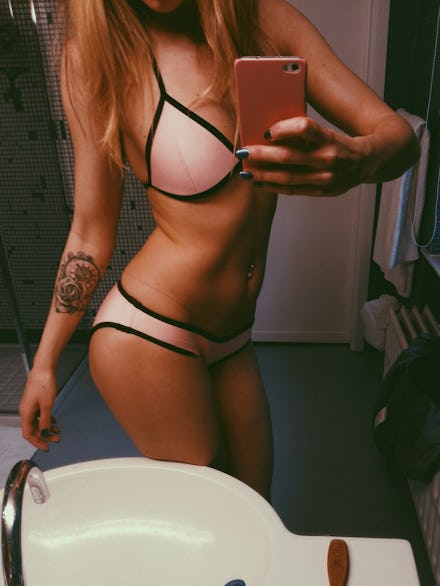There's a Problem With the Term "Thirsty" That We Don't Talk About

A few months ago, a photo of Kim Kardashian West wearing a sequin bikini popped up on Instagram. In the photo, she's paired her swimsuit with a belly chain and has the kind of perfectly straightened hair girls dreamed about in middle school.
"North posted this while playing games on my phone," the caption reads. "Not sure why or how she chose it but I'm not complaining! LOL I deleted it so now reposting it myself! #FBF from 10 years ago."
Yeah, sure, maybe an infant scrolled through the (likely billions of) photos on your phone and posted this one, Kim. Or maybe you could just embrace the fact that you knew you looked amazing and shared it yourself.
Bloggers rushed to call Kardashian West out, with Vulture running a story about the photo with the headline "Kim Kardashian Blamed Her Thirsty Instagram Photo on North." But when you really think about it, the fact that Kardashian West posted a photo of her body looking awesome on Instagram isn't exactly worthy of mockery. (It also shouldn't be particularly surprising, given her exhibitionistic brand.)
Whenever someone is clearly looking for attention and validation on social media, we attach stigma to it, especially when the person looking for it is a woman. But what if women openly conceded to wanting attention in the first place instead — and what if we acknowledged that might not be such a bad thing?
A brief history of thirst: In recent years, the phenomenon of people searching for social media validation has picked up the shorthand "thirst." The history of the word is relatively short, with the first Urban Dictionary definition dating back to 2003. It gained traction with Soulja Boy's "She Thirsty" and Missy Elliot's "Ching-A-Ling" and has since become mainstream.
"Thirst" is a well-worn stand-in for wanting or needing something. Often, it'll be used as a way to express sexual desire for someone (i.e. "I'm so thirsty for my fitness instructor it's not even funny.") But the term can be used to describe people who are perceived to have a sense of shamelessness, translating to "attention-hungry" or "desperate." If you're described as "thirsty" or a "thirst trap," you're determined to achieve your goal of getting likes and compliments at any cost.
It's also important to note that the term "thirst trap" is often applied to women, usually in a negative context. In this context, it doesn't have to apply to women who post lurid selfies on Instagram; often, it can be in an entirely non-sexual, whether it's someone sending numerous emails to a potential employer or even over-engaging on Twitter. Men are rarely, if ever, criticized for this sort of behavior. They're confident, vocal and assertive, while women are attention-hungry and desperate.
A gendered double standard: Much like having resting bitch face or being "bossy," thirst comes with a built-in double standard: Both men and women can exhibit the same thirsty behavior, but we usually condemn women for it. (One of the few exceptions to this rule is the Game, who was roundly labeled as thirsty when he posted a selfie on Instagram featuring his prominent bulge.)
The label of thirst has become yet another way language tries to disguise or render female desire invalid. It delegitimizes naked female ambition, turning it into one more obstacle that stands in the way of women actively pursuing anything for themselves.
Sometimes, women will refer to themselves as thirsty almost apologetically while posting a selfie or a link to their website. Such usage of the term can be fully self-deprecating, a way to cloak your desire for faves in faux humbleness to be deemed acceptable. But there are also empowering re-workings.
Women proudly declaring their thirst can be an act of re-appropriation, shorthand for all the apologizing women are forced to do to ask for the things we want. Saying, "Hey, can I get X influential person's email, I know, I'm thirsty" can be a shortcut for asserting self-awareness. Sharing work you're proud of (or just a really pretty selfie) along with an expression of your own thirst anticipates the ire so often directed at women hoping for attention, thus rendering it invalid.
To be clear, as with all of the words we can attempt to take back, complete success is near impossible. "Slut" and "bitch" are still functional insults employed by insecure men, and while calling a girl thirsty is hardly on par with calling her a slut, both terms are similar in that we can own them and refuse to further weaponize their negative connotations. Just as "slut" can be a term of endearment when used between, say, two female friends, "thirsty" can be a tool for asserting oneself.
When used by another person, the term "thirsty" can be a means of denouncing desire. But we can make decisions about how the word is used and what it means to us. There will always be social norms deriding women who are actively pursuing their wants and needs, but being a thirsty, bossy bitch only becomes a bad thing if you let it.